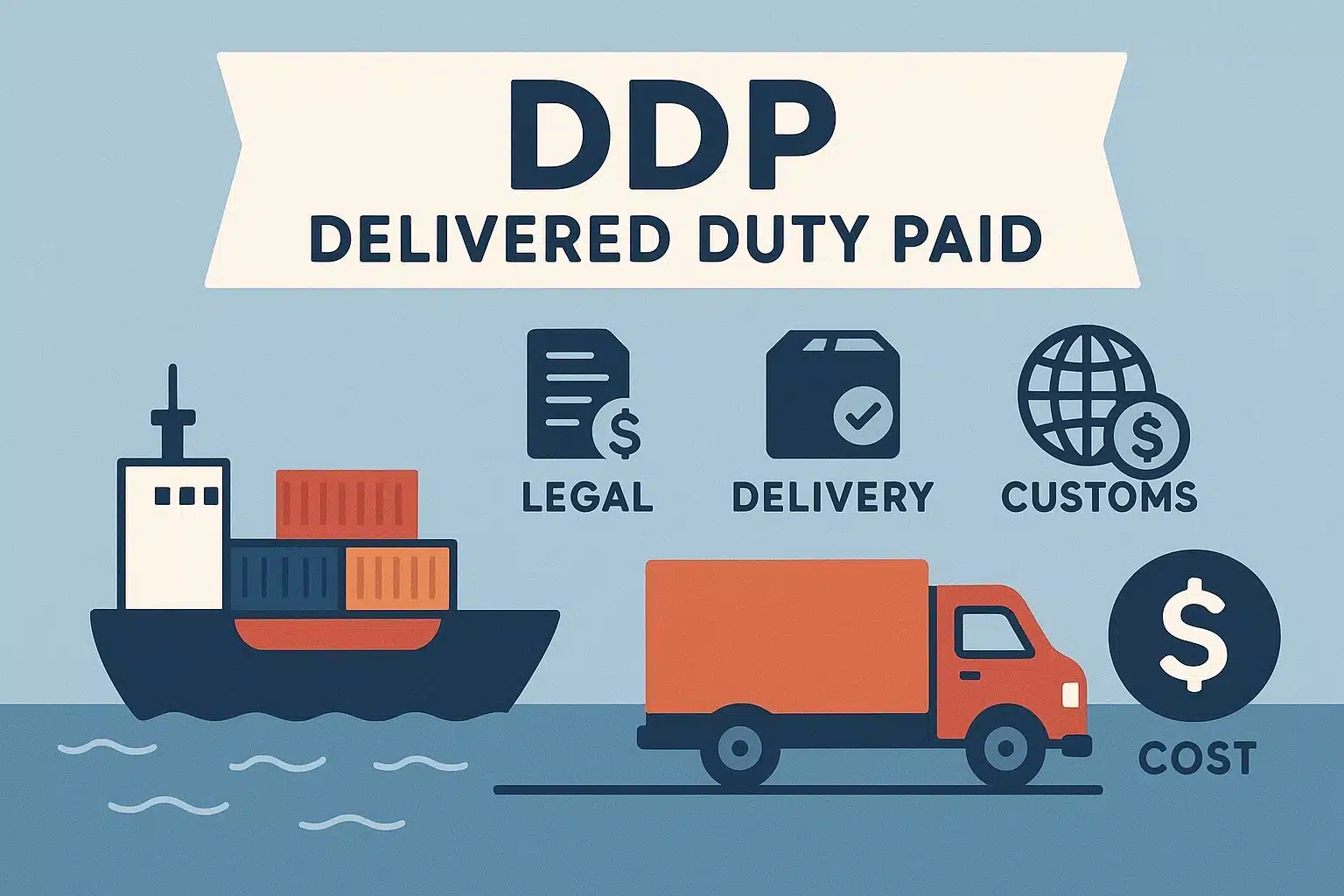
What Does DDP Mean in Shipping?
In international trade and logistics, you’ll often come across shipping terms like FOB, CIF, and DDP. For small businesses trying to scale globally, understanding these terms is crucial to avoid hidden costs and ensure smooth deliveries.
One of the most important terms is DDP (Delivered Duty Paid). But what does it mean, and how can it impact your business? Let’s break it down.
Definition of DDP (Delivered Duty Paid)
DDP (Delivered Duty Paid) is an international shipping agreement under the Incoterms framework.
It means the seller (exporter) takes full responsibility for delivering goods to the buyer’s destination, including all shipping costs, customs duties, taxes, and insurance.
» In short: The seller pays everything until the goods arrive at the buyer’s doorstep.
How Does DDP Work?
Here’s a simplified breakdown of the DDP process:
- Seller prepares the goods and arranges international shipping.
- Export clearance is handled by the seller in the origin country.
- Freight transport (air, sea, or land) is arranged by the seller.
- Import duties, customs, and taxes at the buyer’s country are paid by the seller.
- Final delivery is completed to the buyer’s designated address.
Cost Responsibility in DDP Shipping
| Shipping Element | Responsibility |
|---|---|
| Export documentation | Seller |
| Freight charges | Seller |
| Insurance | Seller |
| Customs clearance (export & import) | Seller |
| Import duties & taxes | Seller |
| Final delivery to buyer | Seller |
Advantages of DDP Shipping
For buyers (importers):
- ✅ Cost Transparency – No surprise duties or fees.
- ✅ Simplified Process – Seller handles all customs paperwork.
- ✅ Lower Risk – Seller bears the responsibility until delivery.
For sellers (exporters):
- ✅ Competitive Advantage – Makes your offer more attractive to international buyers.
- ✅ Customer Satisfaction – Buyers enjoy a smooth, hassle-free experience.
- ✅ Control Over Shipping – Seller chooses carriers, routes, and insurance.
Disadvantages & Risks of DDP Shipping
While DDP can be convenient, it also has some drawbacks:
- ❌ High Seller Responsibility – Seller takes on all financial and logistical risks.
- ❌ Cash Flow Strain – Duties and taxes in foreign countries can be expensive.
- ❌ Complex Compliance – Each country has different regulations.
- ❌ Potential Delays – If paperwork isn’t handled correctly, customs may hold shipments.
DDP vs. Other Shipping Terms
DDP vs. FOB vs. CIF
| Term | Who Pays for Transport? | Who Pays Duties/Taxes? | Delivery Point | Best For |
|---|---|---|---|---|
| DDP (Delivered Duty Paid) | Seller | Seller | Buyer’s address | Buyers who want simplicity |
| FOB (Free on Board) | Seller until port of origin, then Buyer | Buyer | Origin port | Buyers who want control |
| CIF (Cost, Insurance, Freight) | Seller | Buyer | Destination port | Midway balance of risk |
Best Practices for Using DDP
For sellers:
- ✅ Research customs rules in the buyer’s country before offering DDP.
- ✅ Build duties into product pricing to protect profit margins.
- ✅ Work with reliable freight forwarders who understand local regulations.
- ✅ Use insurance to mitigate risk of damage or loss.
For buyers:
- ✅ Check landed cost estimates from the seller to avoid hidden markups.
- ✅ Ask for clear shipping documentation and invoices.
- ✅ Use tracking systems to stay updated on shipments.
Industries That Commonly Use DDP Shipping
Some industries rely on DDP more than others, as it helps simplify global trade:
- E-commerce & Retail → Online stores selling internationally often use DDP to provide a seamless checkout experience.
- Electronics → High-value items with strict regulations benefit from seller-handled customs.
- Fashion & Apparel → Fast-moving consumer goods where customers demand hassle-free delivery.
- Healthcare & Pharmaceuticals → Sensitive items that require guaranteed delivery and compliance.
- Consumer Goods → Everyday items shipped globally where buyers prefer transparency in costs.
How Willowcommerce.ai Helps with DDP Shipping?
At Willowcommerce.ai, we understand how complex DDP shipping can be. That’s why our platform helps small businesses by:
- Automating customs documentation to reduce errors.
- Providing real-time landed cost calculations (duties, taxes, shipping).
- Integrating with multiple carriers for cost-effective DDP shipping.
- Tracking shipments across borders with full transparency.
- Optimizing pricing models so you can offer DDP without losing margins.
With Willowcommerce.ai, small businesses can confidently expand to international markets while maintaining control of shipping costs and compliance.
Frequently Asked Questions (FAQ)
DDP means “Delivered Duty Paid.” The seller covers all costs until the goods reach the buyer.
DDP shipping (Delivered Duty Paid) removes stress for buyers by giving them an all-inclusive price with no hidden fees. While sellers take on more responsibility, DDP can boost customer trust, improve international sales, and create a competitive edge.
» With Willowcommerce.ai, small businesses can automate DDP processes, manage costs, and deliver a seamless global shipping experience.
» Start Your Free Trial